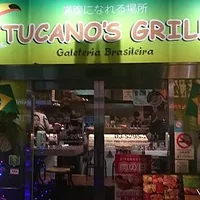ブラジル の あじ 。。。(n4)GaleteriaBrasileira
Brasilianische Aji ... (n 4) Galeteria Brasileira
Brazilian horse mackerel ...(n 4) Galeteria Brasileira
Ají Brasileño ... (n 4) Galeteria Brasileira
Aji brésilien ... (n 4) Galeteria Brasileira
Braziliaanse Aji ... (n 4) Galeteria Brasileira
Carapau brasileiro ...(n 4) Galeteria Brasileira
Бразильская аджи ... (n 4) Galeteria Brasileira
巴西竹荚鱼 ...(n 4) Galeteria Brasileira
巴西竹莢魚 ...(n 4) Galeteria Brasileira
東京 の 秋 葉 原 と いう 町 に トゥッカーノ グリル と いう レストラン が あります。
とうきょう||あき|は|はら|||まち||||||||
There is a restaurant called Tucano Grill in the town of Akihabara in Tokyo.
Existe um restaurante chamado Tucano Grill na cidade de Akihabara em Tóquio.
ステーキ が 食べられる お店 です。
||たべられる|おみせ|
This is a restaurant where you can eat steak.
Este é um restaurante onde você pode comer bife.
這是一家可以吃牛排的餐廳。
トゥッカーノ グリル の ような 店 が 、 ブラジル で 人気がある そう です。
||||みせ|||||にんきがある|
Ich habe gehört, dass Restaurants wie Tuccano Grill in Brasilien sehr beliebt sind.
I heard that restaurants like Tuccano Grill are popular in Brazil.
Ouvi dizer que restaurantes como o Tuccano Grill são populares no Brasil.
显然,像 Tucano Grill 这样的餐厅在巴西很受欢迎。
顯然,像 Tucano Grill 這樣的餐廳在巴西很受歡迎。
どんな お店 でしょうか。
|おみせ|
What kind of shop is it?
Que tipo de loja é?
這是一家甚麼樣的店呢?
お店 の 中 に 入って みます。
おみせ||ちゅう||はいって|
Let's go inside the shop.
Vamos entrar na loja.
我们去商店里面看看吧。
我們去商店裡面看看吧。
カウンター と テーブル の 席 が あります。
||||せき||
There are counter and table seats.
Há assentos de balcão e mesa.
Есть стойки и столы.
有柜台座位和桌子座位。
有櫃檯座位和桌子座位。
料理 して いる ところを 見られる ので 、 私 は 迷わず に カウンター の 席 に 座りました。
りょうり||||みられる|||わたし|は|まよわず||||せき|
Ohne zu zögern setzte ich mich an die Theke, weil ich sehen konnte, wie das Essen zubereitet wurde.
Without hesitation, I sat down at the counter because I could see the food being prepared.
Sem hesitar, sentei-me no balcão porque pude ver a comida sendo preparada.
Не долго думая, я сел за стойку, потому что мог видеть, как готовится еда.
我毫不犹豫地坐在柜台前,这样我就可以看到食物正在烹饪。
我毫不猶豫地坐在櫃檯前,這樣我就可以看到食物正在烹飪。
いろいろ な しゅるい の お 肉 が あります。
|||||にく||
There are various kinds of meat.
Existem vários tipos de carne.
Есть разные виды мяса.
食べすぎる と 太ります から。 。。
たべすぎる||ふとります|
If you eat too much, you will gain weight...
Se você comer demais, você vai ganhar peso.
如果你吃得太多,你就会发胖。 。 。
如果你吃太多,你就會變胖。 。 。
でも 300g の ステーキ を 注文 して しまいました。
|||||ちゅうもん||
But I ended up ordering a 300g steak.
Mas acabei pedindo um bife de 300 g.
Но в итоге я заказал 300-граммовый стейк.
但我最终还是点了一份300克的牛排。
但我最後還是點了一份300克的牛排。
来ました。
きました
It came.
左 から 、 " ランプ " " うま み 牛 " " サーロイン 「 です。
ひだり|||||||うし
From the left, "rump", "umami beef" and "sirloin".
A partir da esquerda, "alcatra", "carne de umami" e "lombo".
从左至右:“臀部”、“鲜味牛肉”和“牛腰肉”。
一度に 3 しゅるい の お 肉 を 楽しめます。
いちどに|さん||||にく|
Sie können 3 Fleischstücke auf einmal genießen.
You can enjoy 3 pieces of meat at once.
This sentence is not in the audio, but it's on the web page.
Você pode desfrutar de 3 pedaços de carne ao mesmo tempo.
一次可以享用3块肉。
一次可以享用3塊肉。
最高 に 美味しかったです。
さいこう||おいしかったです
Es hat sehr gut geschmeckt.
It was delicious.
Estava uma delícia.
绝对美味。
絕對美味。
注文 して しまいました|料理 して いる

